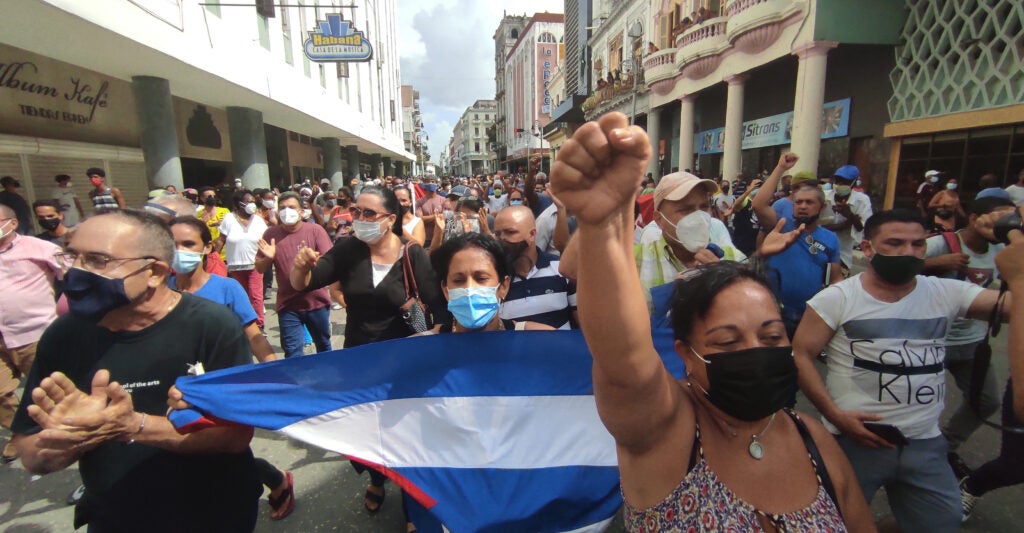Antonio Rodiles said he has lost count of how many times he was arrested in Cuba.
The human rights activist in 2010 founded Estado de SATS in Cuba, a forum calling for political and economic reform in his home country.
Rodiles, who is now visiting Florida and lives in Cuba, says he is watching the new demonstrations there with both hope and concern.
“A priest was brutally arrested and he is now in prison. They [the regime] don’t have limits,” Rodiles said, adding that the priest beaten by authorities is a close friend.
“The priest was just walking with the rest of the protesters and he was just watching what was happening,” Rodiles told The Daily Signal in a phone interview. “The police stopped people and they brutally repressed the crowd. He was trying to stop these actions and trying to protect the people, and they beat him. And now he is in jail.”
Estado de SATS, or State of SATS in English, is made up of artists, writers, intellectuals, and professionals. The word “sats” is a Scandinavian term referring to the moment preceding a theatrical action or sports performance—or a moment of great concentration before a major occurrence. In this case, meaning a major change in Cuba.
Cuban police forces used mass arrests to quell many protests that Rodiles said broke out Sunday in about 30 cities across Cuba. But, he said, any control of such demonstrations could be temporary:
The situation is getting worse. That implies that sooner or later, we are going to have the same social explosion again. At the same time … I don’t have a doubt about the limits of the regime. They are going to do whatever they need to do in order to keep the power.
Fidel Castro, who seized power in Cuba on Jan. 1, 1959, handed control of the communist government to his brother, Raúl Castro, before his death at age 90 in November 2016. When the younger Castro stepped down at 87 in February 2018, Miguel Díaz-Canel became president but is considered a figurehead as Castro, head of Cuba’s Communist Party, continues to make major government decisions.
Rodiles, 48, received a doctorate in physics from the Institute of Nuclear Sciences at the National Autonomous University of Mexico. He also received a master’s degree in mathematics from Florida State University in 2007 before returning to Cuba to coordinate Estado de SATS, the pro-freedom group.
After Cuban police arrested and jailed Rodiles in 2012 for “resisting authority,” the human rights organization Amnesty International called for his release.
“Before they could reach the building they were approached by 20 people, all plain-clothed, as two officials from the Ministry of the Interior looked on,” a statement from Amnesty International explained in 2012. “Antonio Rodiles was reportedly knocked to the ground and pinned down by four men. Several of the other activists were also manhandled and were forced into a police vehicle and sent to various police stations around Havana.”
The current protests against Cuba’s socialist government present an opportunity for the United States to push for change in the Caribbean nation of more than 11 million, Rodiles told The Daily Signal.
“The U.S. needs to help the Cuban people finish with the Castro tyranny,” Rodiles said, adding:
It is 62 years of these people in power. They have been creating a lot of problems around the continent. The situation now is really worse. It is clear they don’t have the solution.
The standard of living for the Cuban people is worse. They are not going to give the possibility for the people to improve because they want to keep not just the power, they want to keep the whole power.
The severity of COVID-19 in Cuba has given the regime an excuse to attempt to stifle protests, he said.
The Heritage Foundation’s 2021 Index of Economic Freedom ranks Cuba’s economy as No. 176 out of 178 nations scored for economic freedom.
“The coronavirus is increasing, but also they are using that in order to have more control over the society because the crisis was increasing previous to the coronavirus,” Rodiles said. “Most of the Cuban people survive because of the black market. Now [the regime] has been trying to control that, and this increases the economic crisis. You add to that the situation with the coronavirus, [and] it is even worse every day.”
Amid growing support among young people inside the United States for socialism, Rodiles said, Cuba offers a lesson:
Every society needs to rest in individual freedom and not collective. The individual is the core of the society. If you don’t have that, then you are going to have a big state of people that want to manage your private life, your freedom.
We saw what we have in Cuba is a huge crisis and a lot of people [are] trying to escape to … a different country in order to have a different life.
This story was updated to note that Rodiles is currently visiting Florida.
Have an opinion about this article? To sound off, please email letters@DailySignal.com and we’ll consider publishing your edited remarks in our regular “We Hear You” feature. Remember to include the url or headline of the article plus your name and town and/or state.
